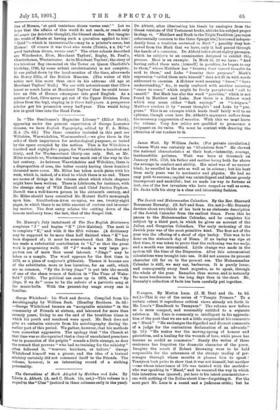Dr. Abbott, after illustrating his thesis by analogies from the
Greek versions of Old Testament books, attacks his subject proper in chap. vi. "Matthew and Mark in the Triple Tradition [passages substantially common to the three Synopt ists] borrowed indepen- dently from a tradition contained in Mark"; possibly they bor- rowed from the Mark that we have, only it had passed through the hands of a corrector. Dr. Abbott takes about eighty passages, which he subjects to an examination designed to exhibit this process. Here is an example. In Mark iii. 23 we have "And having called them unto Lhimself] in parables, he began to say to them," where Matthew has "knowing their inward thoughts he said to them," and Luke "knowing their purposes." Mark's expression "called them unto himself '' does not fit in with worth addressed to enemies. A Hebrew word meaning "know." "have understanding," &c., is easily confused with another meaning "cause to come," which might be freely paraphrased "call to oneself." But Mark has also the word "parables," which is not found in Matthew and Luke. Now there is a Hebrew word which may mean either "dark sayings" or "intrigues." Matthew renders it by "secret thoughts" and Luke by " pur. poses." This is an example which lends itself fairly well to an epitome, though cc-en here Dr. Abbott's argument suffers from the necessary suppression cf minutix. With this we must leave the volume. Very few critics are qualified to pronounce a judgment on its value. We must be content with drawing the attention of our readers to it.






































 Previous page
Previous page